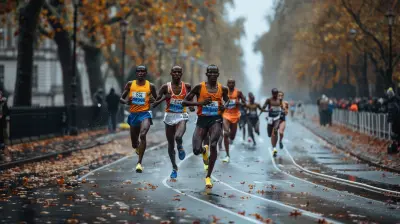How to Mentally Recover After a Tough Rugby Loss
16 November 2025
Let’s be real—there’s no sugarcoating a tough rugby loss. Especially after you’ve poured your heart, sweat, and maybe even a little blood onto the pitch. You trained for weeks, maybe months. You gave it everything you had. And still, it just didn’t go your way. So now what?
Trust me, if you’ve found yourself staring at the ceiling the night after a rough game, replaying every missed tackle or poor decision—you’re not alone. Every rugby player, from weekend warriors to pros, has been there. The key isn’t avoiding losses (because they will happen). It’s learning how to bounce back stronger—mentally speaking.
Below, let’s break down how to mentally recover after a tough rugby loss. No fluff. Just tried-and-true steps to help you pick yourself up, dust off, and get your head back in the game.
1. Give Yourself Permission to Feel It
First of all—let it hurt. Seriously. You’re not a robot. You care about the game. That sting in your chest? It's proof that the game means something to you.Don’t bottle it up or pretend like everything’s fine when it’s not. Take a moment. Cry a little. Punch your pillow. Eat a whole pizza (no judgment here). Allowing yourself to feel disappointed is actually part of healing.
Why This Matters:
Ignoring your feelings doesn't make them disappear. It’s like ignoring a cramp mid-game—it’s only going to get worse. Processing your emotions early helps prevent burnout and lets you move forward.
2. Talk It Out with Your Teammates
No one gets it more than the people who lined up beside you. Your teammates felt the same sting, the same frustration. Talking things through—what worked, what didn’t, how everyone’s feeling—can be surprisingly therapeutic.Maybe there’s even a group chat blowin’ up with memes, jokes, or venting. Lean into that. Sometimes a simple "That game sucked, huh?" can open the door to a deeper conversation.
Bonus Tip:
Avoid finger-pointing or blame during these talks. You're all in this together. Focus on support, not guilt-tripping.
3. Shift the Focus to What Went Right
It’s easy to obsess over what went wrong. That last minute try from the opposing team. That missed conversion. The bad call from the ref. But rewind the tape and look for the highlights too. There are always positives, even in a loss.Think about:
- The killer tackle you made that saved a try
- The new set play that actually worked out great
- The younger players who stepped up
Recognizing your wins—even small ones—keeps the fire alive.
4. Take a Break (Yes, Really)
This part’s crucial: give yourself a short break. That doesn’t mean quitting. It means recharging. Go for a walk. Ditch the rugby podcasts for a day. Play video games. Watch a comedy. Let your brain breathe.Your mind needs rest just like your body. After a physically and emotionally intense match, stepping back helps you gain perspective.
Think of it Like This:
Imagine your brain like a muscle—after a heavy workout (aka, a stressful game), it needs time to recover and rebuild stronger. Not every recovery involves sprint drills.5. Reflect with Honesty, Not Judgment
This one’s tricky, but vital. Take some time to reflect on your performance—but do it with kindness. Don’t beat yourself up. Ask yourself:- What could I have done differently?
- What did I learn?
- What will I try next time?
Write it down, if that helps. Think of it as notes-to-future-you. The goal isn’t to wallow in mistakes, but to use them as stepping stones.
6. Reconnect with Your “Why”
Why did you start playing rugby in the first place? Was it the camaraderie? The adrenaline rush? The love of competition? Go back to that.A tough loss can make you question everything—your skills, your role on the team, your future in the sport. But reconnecting with your original “why” helps anchor you.
Quick Exercise:
Write down 3 reasons you love rugby. Stick that somewhere visible—your mirror, your locker, maybe as your phone wallpaper. It’s a simple reminder of the bigger picture.7. Set Micro-Goals for the Next Game
Instead of wallowing, start planning. But keep it small. Micro-goals are like baby steps back onto the pitch. For example:- Improve communication during defensive plays
- Focus on fitness during training this week
- Get to practice 15 minutes early
Tiny wins build momentum. And momentum builds confidence.
Pro Tip:
Share these goals with a teammate or coach. Accountability is a powerful motivator.8. Lean on Routine
After a loss, it’s tempting to throw everything out the window. Skip the gym. Miss training. Fall into bad habits. But sticking to your normal routine—especially your training routine—grounds you.Routine reminds your brain: "Hey, I’m still in this. I’m still committed.” Even if you’re not feeling 100%, showing up for drills, warm-ups, and workouts reignites that spark.
9. Learn, Adjust, and Move On
This is where growth happens. Every rugby game teaches you something—especially the ones that hurt the most. The question is, are you listening?Watch the game footage with an open mind. Look for patterns. Talk to your coach about what needs adjusting. And then—move on.
Don’t carry the loss like a backpack full of rocks into the next match. Learn what you need to, then leave the rest behind.
10. Surround Yourself with Positivity
This doesn’t mean you need to be fake-happy. But your environment matters. Hang out with people who lift you up. Watch inspiring sports documentaries. Read stories about athletes who’ve bounced back.Positive input leads to positive output. Even something as simple as a motivational playlist on the way to training can flip your mindset.
11. Practice Mental Training (Yes, It’s a Thing)
Athletes train their bodies constantly—but what about your mind?Try incorporating mental training techniques like:
- Visualization (imagining yourself nailing that next try)
- Mindfulness or meditation apps
- Breathing exercises before games
Developing mental toughness is just as critical as physical strength. And it pays off big time after tough losses.
12. Remember: Even the Pros Lose...A Lot
Ever hear of the All Blacks? Yeah, New Zealand’s legendary rugby team. Even they’ve had crushing losses. World Cup heartbreaks. Upsets no one saw coming.But guess what? Losses forged them. They used failures as fuel.
So give yourself some grace. One game doesn’t define your worth as a player—or a person. It’s all part of the journey.
Final Thoughts: You’re Still in the Game
Losing sucks. There’s no polite way to say it. But what matters more than the scoreboard is how you respond. Will you hide away and stew? Or will you take the hit and stand back up, mentally sharper and stronger?You’ve got more grit than you give yourself credit for. A tough loss isn’t the end—it might just be the beginning of your next breakthrough.
So lace up your boots, keep your chin up, and remember: even when you lose, you're still learning how to win.
all images in this post were generated using AI tools
Category:
RugbyAuthor:

Uziel Franco
Discussion
rate this article
1 comments
Zephyrae McLaughlin
Great read! Losing can be tough, but it’s all part of the game. Remember, every setback is a step towards growth. Embracing those feelings and leaning on your teammates can really help. Let’s keep our heads up and focus on coming back stronger! Onwards and upwards! 🏉💪
November 25, 2025 at 5:31 AM

Uziel Franco
Thank you! Absolutely agree—every setback is a learning opportunity. Let’s keep pushing forward together! 💪🏉


